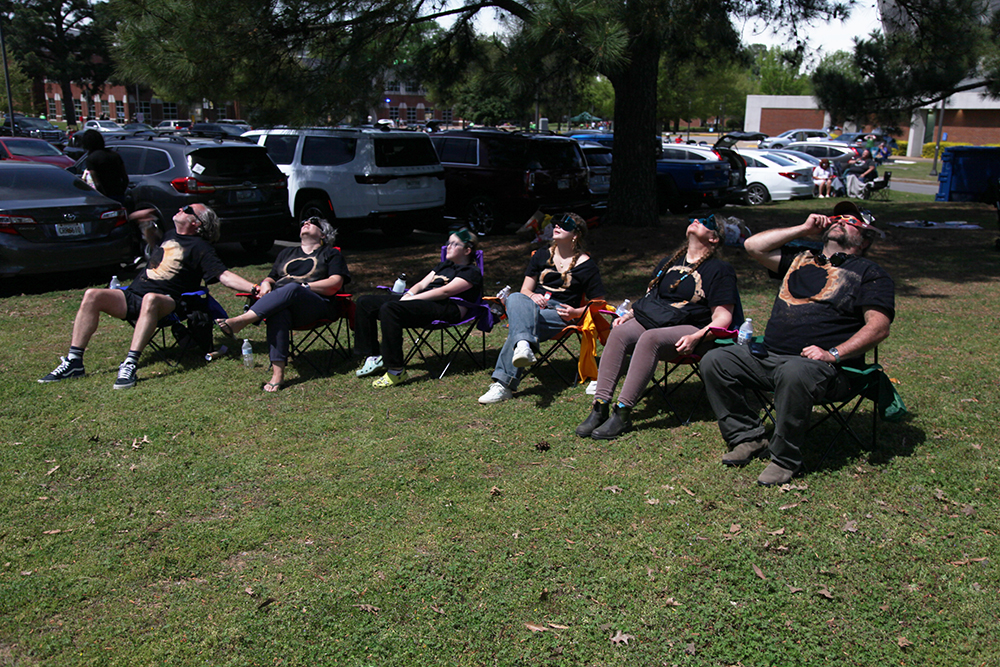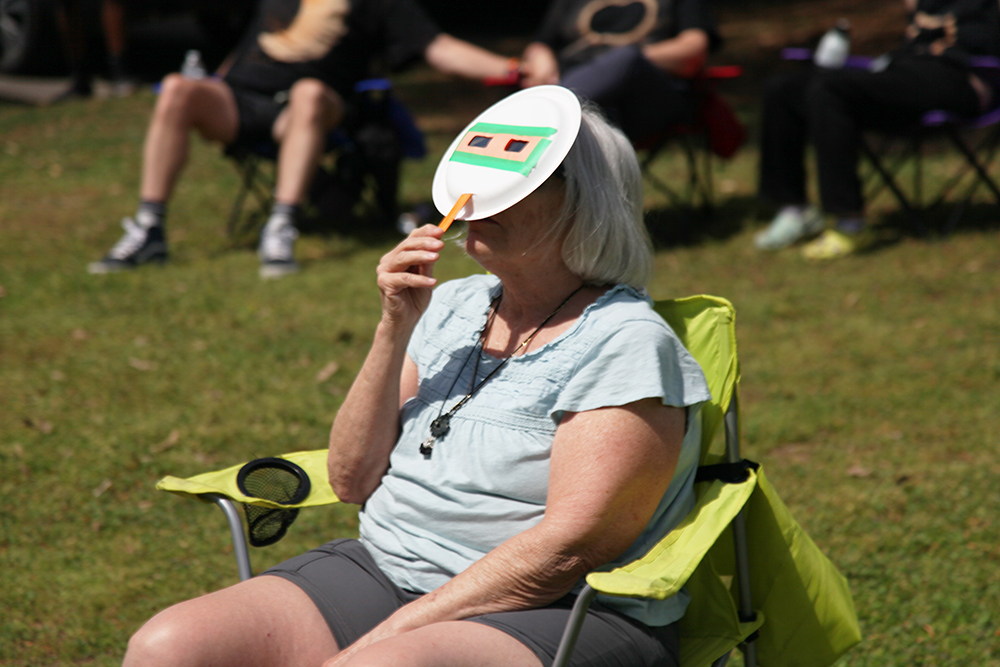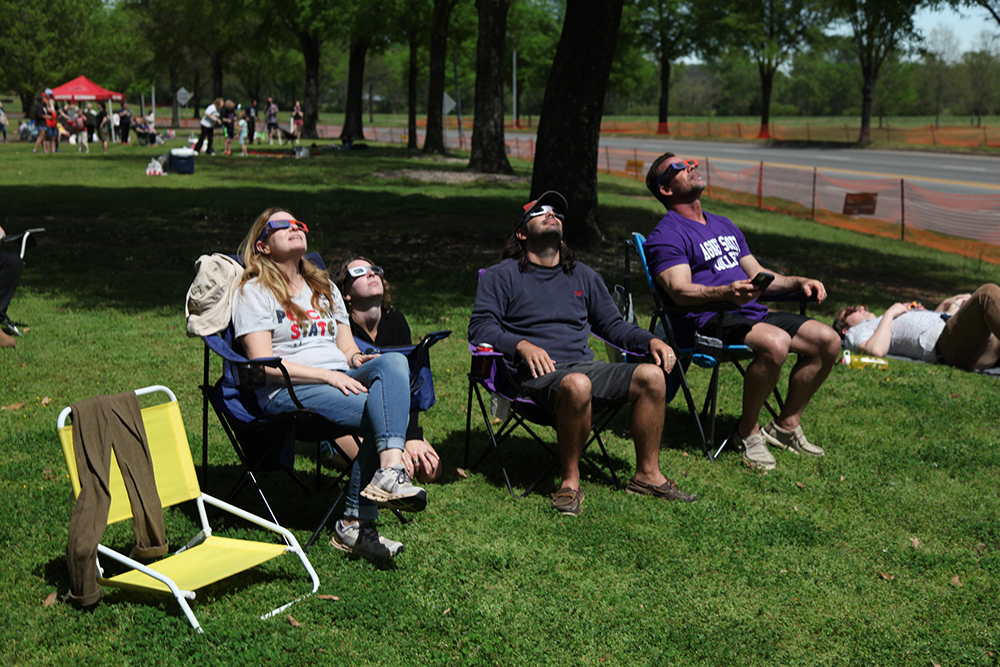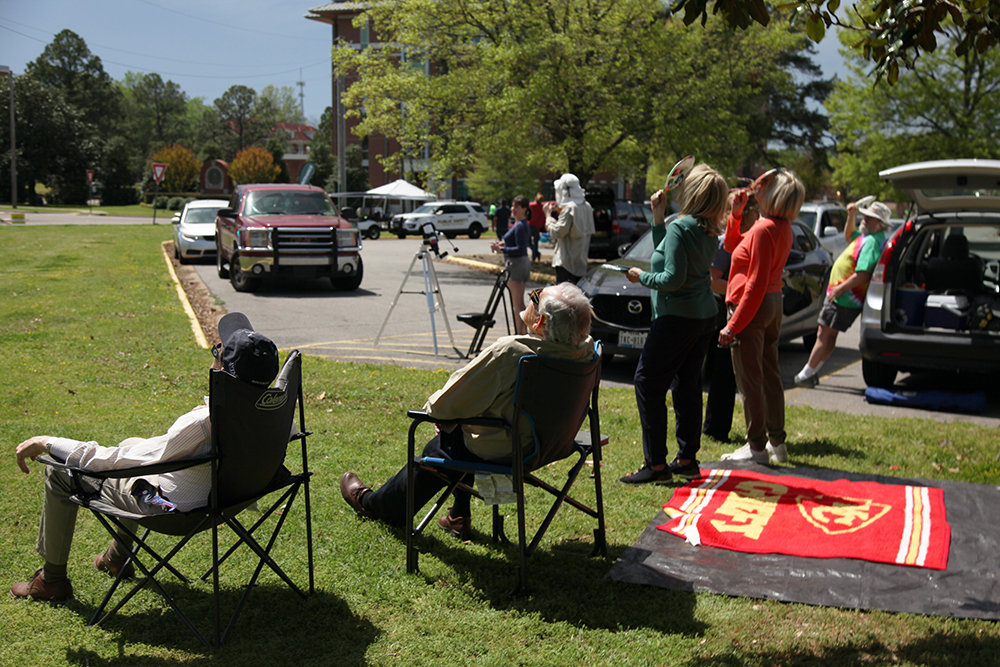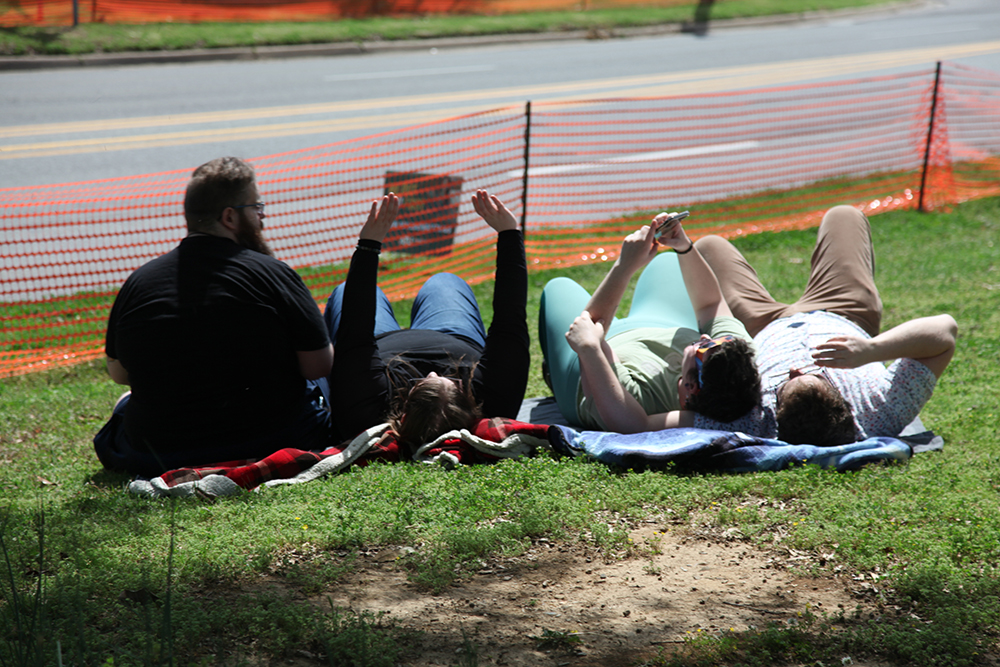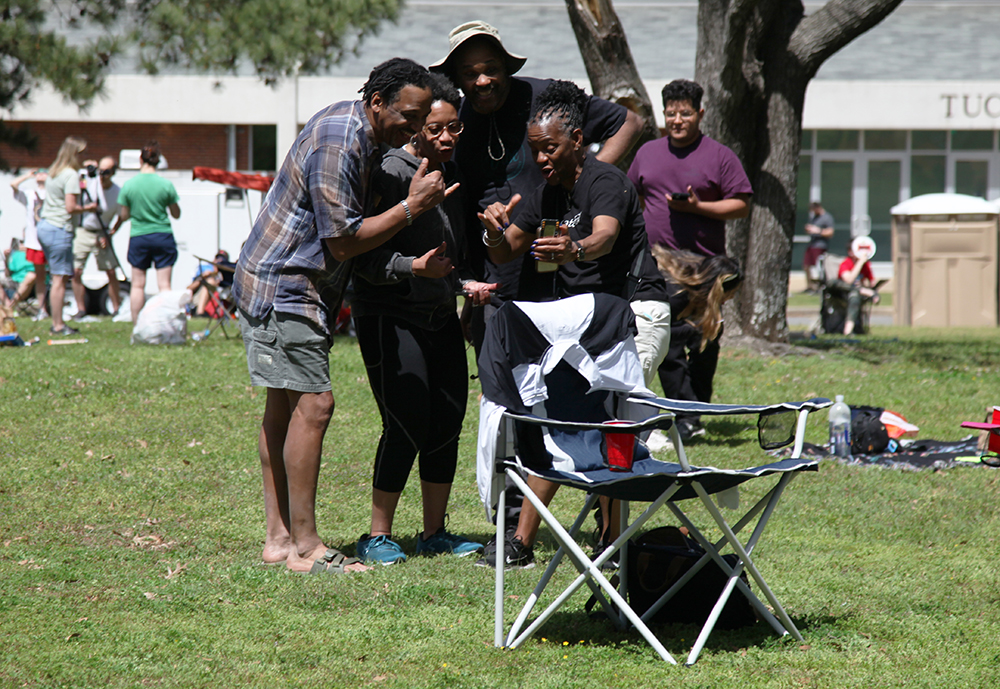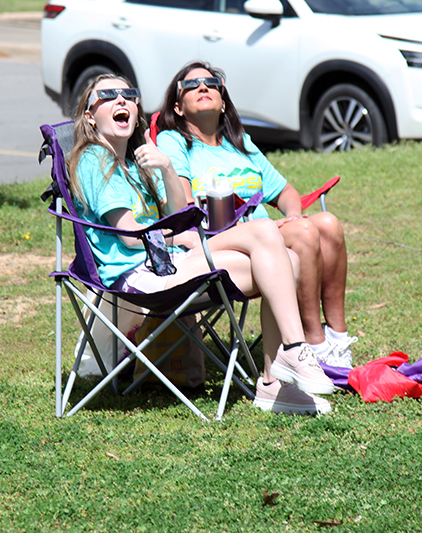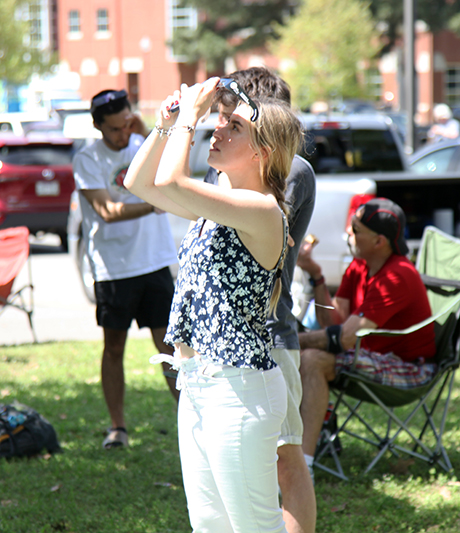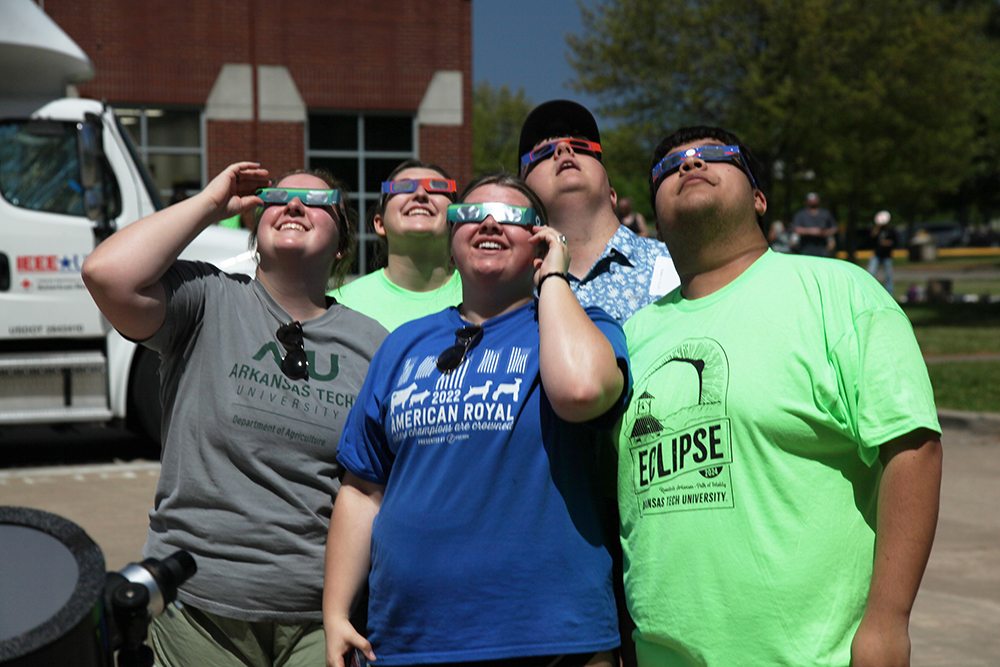
As the moment arrived at 1:50 p.m., there was a brief shriek of glee among the family, friends and strangers gathered on the greenspace outside Tucker Coliseum at Arkansas Tech University.
Then there were four minutes of peace. Blissful, uninterrupted peace as those who had come from so many different places all gazed in wonder at the same dance playing out before their eyes in outer space.
A total solar eclipse was visible at ATU in Russellville from 1:50-1:54 p.m. on Monday, April 8, just like Susan West, ATU associate professor of tourism, has been telling the campus community for more than four years. She learned of the forthcoming event at a conference in February 2020 and rushed home to Arkansas Tech to begin jolting those around her into action.
Eighteen months of frenetic activity as the chair of ATU’s eclipse committee culminated in a few moments of serenity on Monday afternoon.
“They were just kind of indescribable,” said West when asked about the four minutes of totality. “It’s like it’s night, but it’s day. Your brain knows that it’s Monday afternoon, but it really didn’t feel like it. I thought it was incredible and everything I was hoping for.”
ATU shifted to virtual classes and operations beginning Friday, April 5, in preparation for the total solar eclipse. Chief Joshua McMillian and officers from the ATU Department of Public Safety worked with registered student organizations to secure the campus and ensure a safe environment for those who wished to view the eclipse at Arkansas Tech.
Those student organizations were prepared for the event by training hosted by ATU’s academic program in emergency management and homeland security. Chelsea Neal and Rhylie Gachot from the ATU Department of Campus Life were among those who ensured the student organizations were supported and fed during their work schedules.
“I am so happy because it took the entire campus to make this happen,” said West. “I felt so fortunate that everything went off without incident. We sold more parking spots than we planned to. We had zero to no incidents. I’m in awe of our students. The emergency management students who handled the command office…the student volunteers who worked 12 hours on and 12 hours off…I’m in awe of Arkansas Tech, as I always have been.”
Hayden Eason, a junior information technology major from Rogers, and his friends in the ATU eSports Club were among those who assisted with the execution of Arkansas Tech’s eclipse plan. Proceeds from the rental of parking spots to ATU guests will be reinvested in the student organizations that provided workers for the eclipse.
“At first, it was getting a little colder and seeing the area get darker gave me an eerie feeling,” said Eason when reflecting on the four minutes of totality. “What really surprised me was how cold it got, how dark it got and how silent it got. Normally you hear birds chirping, but it was dead quiet after the moon overtook the sun. Right after that, it was brilliant seeing the solar flares and the corona. At first, I didn’t understand people traveling all over the country. Now I understand. It was incredible and I’d love to experience it again.”
ATU’s agriculture program was also represented among the student volunteers. Freshman Fernando Flores of Clarksville was one of them.
“The only word is amazed,” said Flores. “It’s the kind of thing you only see once in a lifetime if you’re lucky. When the light came back, it was like snapping back to reality. There was a great sense of togetherness, especially being with friends here at Tech. It was fun to see their reactions. We were calling our parents and sharing our reactions with them. Working the eclipse together was worthwhile and something I appreciated.”
The hours leading up to the eclipse included a variety of educational booths outside Doc Bryan Student Services Center. There was a live stream of the NASA TV broadcast, an opportunity to ask questions of an astronomer, various eclipse models using household items and a chance to make sun viewers from paper towel rolls and eclipse masks from paper plates.
A coloring station, pinhole viewers, a pick-up station for eclipse glasses, telescopes and a disaster response vehicle provided by the Institute of Electrical and Electronics Engineers rounded out the pre-eclipse programming.
Dr. Matthew Hankins, ATU assistant professor of physics, oversaw that programming and was a member of the ATU eclipse committee. Monday was his first total solar eclipse.
“Four minutes goes fast,” said Hankins when asked about the period of totality. “By the time you look at it, really let it sink in and snap a quick photograph, it’s done. It went faster than I thought. It’s a surreal, other worldly experience. It was a little unfortunate we had some high cloud cover at the time. You could see the corona immediately around the sun, if we didn’t have that cloud cover you could actually see it even larger on the sky than what we saw. But even at that, it was still nice and visible. I’m not going to complain.”
Hankins joined his colleague, Dr. Amber Harrington, ATU associate professor of physics, in making several visits to area K-12 schools to talk about the eclipse leading up to the event.
“To me, that’s probably the most important thing about this,” said Hankins. “Experiences like this are what get people thinking about studying physics and astronomy. You’re seeing the eclipse now, but within 2-to-3 years NASA is going to be back on the moon. Even though the eclipse is over, the moon is going to be in the news a lot more in the next five years. The students who are going through the school system now, if they choose these disciplines and continue on that path, they will be the people working on those missions in the future. So, it’s definitely a cool thing to get people thinking about that and hopefully sending a few more students down that path.”
The sun was pretty well back to normal by the time West’s post-eclipse golf cart tour of campus brought her to Ross Pendergraft Library and Technology Center. As the ATU eclipse committee chair stood on the drive between the library and Witherspoon Hall, she reflected on an effort that extended well beyond the bounds of the ATU campus.
“Everyone working together and the communication across the entire city has been amazing,” said West. “To have NASA here and to have the scientists from Paris here…it was really, really neat. I’m very proud of Russellville. I’m very proud of Arkansas. And when our guests all leave, I think they’re going to have a great, great feeling. That’s what it’s all about.”
